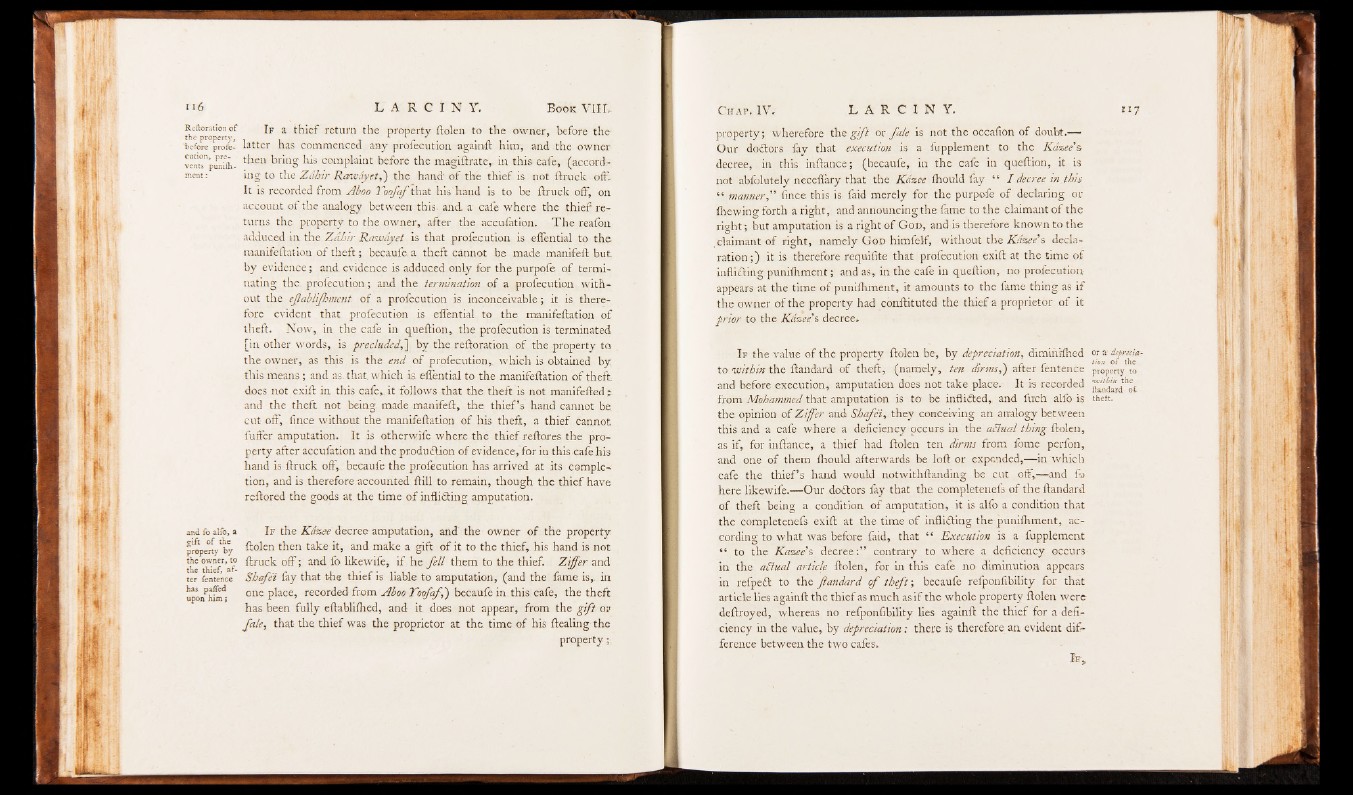
p l
F t
Iip \.:
Reitoration of If a thief return the property ftolen to the owner, before thethe
property, . . r . . .
'before prole- latter has commenced any profecution againft him, and the owner
v ents "punUh- ^len bring his complaint before the magiftrate,. in this- cafe, (accords
ment; ing to the Zabir Raavdyetf) the hand’ of the thief is not ftruck off.
and fo alfo, a
gift of the
property by
the owner, to
the thief, afMUr
ter fentence
has parted
H i I upon him;
It is recorded from Aboo Toofaf that his hand is to be ftruck off, on
account of the analogy between this, and a cafe where the thief returns
the property to the owner, after the accufation. The reafon
adduced in the ZdJoir Rawdyet is that profecution. is eflential to the
manifeftation of theft; becaufe a theft cannot be made manifeft but
by evidence; and evidence is adduced only for the purpofe of terminating
the profecution; and the termination of a profecution without
the efablifhmcnt of a profecution is inconceivable; it is therefore
evident that profecution is eflential. to the manifeftation of
theft. Now, in the cafe in queftion, the profecution is terminated
[in other words, is precluded,] by the reftoration of the property ta
the owner, as this is the end of profecution, which is obtained by
this means; and as. that which is eflential to the manifeftation of theft
does not exift in this cafe,, it follows that the theft is not manifefted
and the theft not being made manifeft, the thief’s hand cannot be
cut off, lince without the manifeftation of his theft, a thief cannot
fufter amputation. It is otherwife where the thief reftores the property
after accufation and the produdtion of evidence, for in this cafe his
hand is ftruck off, becaufe the profecution has arrived at its completion,
and is therefore Recounted ftill to remain, though the thief have
reftored the goods at. the time of inflicting amputation.
If the Kdzee decree amputation, and the owner of the property
ftolen then take it, and make a gift of it to the thief, his hand is not
ftruck off; and lb likevvife, if he fe ll them to the thief. Ziffer and
Shefei fey that the thief is liable to amputation, (and the feme is,, in
one place, recorded from Aboo Toofaf J) becaufe in this cafe, the theft
has been fully eftablifhed, and it does not appear, from the gift or
fate, that- tire thief was the proprietor at the. time of his Healing the
property;
property; wherefore tht g ift or fale is not the occafion of doubt.—
Our dodtors fey that execution is a fupplement to the Kdzee’ s
decree, in this inftance; (becaufe, in the cafe in queftion, it is
not abfolutely necefiary that the Kdzee fhould fay “ I decree in, this
“ manner,” fince this is- feid merely for. the purpofe of declaring or
flrewing forth a right, and announcing the fame to the claimant of the
right; but amputation is a right of God, and is therefore known to the
.claimant of right, namely God himfelf, without the Kdzee’ s declaration
;) it is therefore requifite that profecution exift at the time of
in f l i c t in g :puniftiment; and as, in the cafe in queftion, no profecution
appears at the time, of puniftiment, it amounts to the fame thing as if
the owner of the property had conftituted the thief a proprietor of it
prior to the Kdzee’ s decree.
If the value of the property ftolen be, by depreciation, dimiiirfhed or« defrnia-
to within the ftandard of theft, (namely, ten dirms,) after fentence property to
and before execution, amputation does not take place. It is recorded S '
from Mohammed that amputation is to be inflicted, and ftrch alfo is theft,
the opinion of Ziffer and Shafei, they conceiving an analogy between
this and a cafe where a deficiency occurs in the actual thing ftolen,
as if, for inftance, a thief had ftolen ten dirms from feme perfon,
and one of them fhould afterwards be loft or expended,— in which
cafe the thief’ s hand would notwithftanding be cut off,-4and fo
here likewife.— Our doftors fay that the completenefs of the ftandard
of theft being a condition of amputation, it is alfo a condition that
the completenefs exift at the time of inflifting the puniftiment, according
to what was before feid, that “ Execution is a fupplement
“ to the Kazee’ s decree-.” contrary to where a deficiency occurs
in the actual article ftolen', for in this cafe no diminution appears
in refpeft to the fandard o f theft-, becaufe refponfibility for that
article lies againft the thief as much as if the whole property ftolen were
deftroyed, whereas no refponfibility lies againft the thief for a deficiency
in the value, by depreciation: there is therefore an evident difference
between the two cafes.
If,